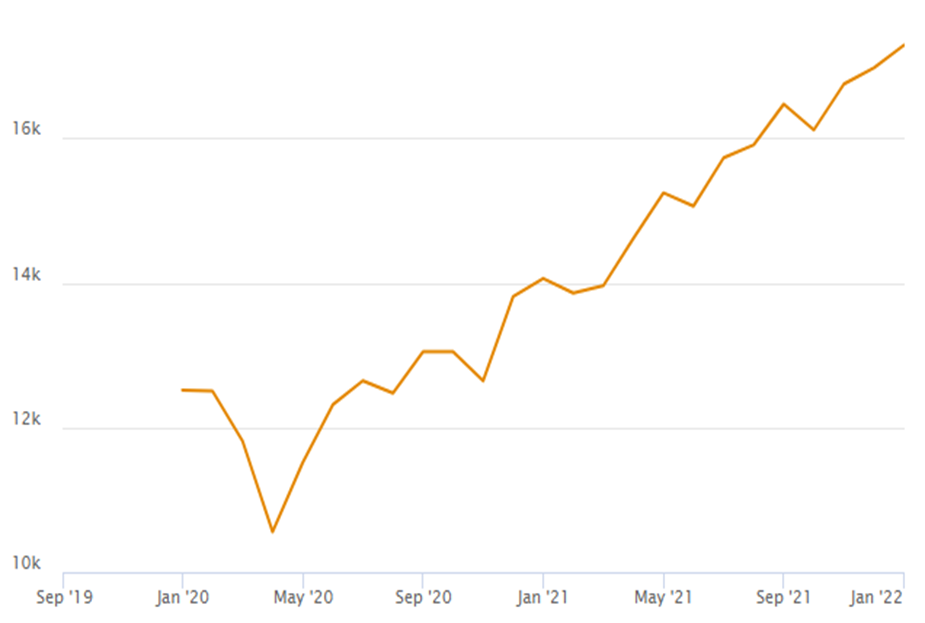Investing
5 positive actions to help your wealth survive a stock market crash

As we start 2022, it seems that the world is still an uncertain place thanks to the ongoing Covid pandemic. Little wonder that, according to research, the effects of the Omicron variant and wider coronavirus have resulted in 56% of investors worrying there may be a stock market crash due.
The study, carried out by interactive investor, found that out of the 1,900 questioned, more than half felt it was the biggest threat to their personal finances in 2022. Next was inflation, which was cited as the biggest risk by 22% of those questioned, and increased tax came third with 8%.
While stocks and shares broadly performed strongly in 2021, that is no guarantee that there won’t be a downturn. So, what can you do if the market slides and your investments drop in value?
Read on to discover five things you could do that will help you survive a significant market downturn.
1. Stay calm and take a long-term view
In the financial sector there is an often used saying that goes: it’s time in the market, not timing the market that’s important.
Seeing your investments as a long-term venture means you’re less likely to be unnerved by a downturn in the market. Instead, you are more likely to see it as the natural ebb and flow of investing, which means you’ll be happy to sit the downturn out and wait for your investments to potentially grow again in the future.
To demonstrate this, you may want to consider the 2019 Barclays Equity Gilt Study. It tracked the nominal performance of £100 invested in cash, bonds, and equities between 1899 and 2019, and shows that equities outperformed cash in 69% of two-year periods.
Extend that to 10-year periods, and stock markets outperformed cash 91% of the time. The study also revealed that if £100 had been invested in cash in 1899, it would be worth just over £20,000 in 2019.
If the money had put the money into stocks and shares, it would have been worth around £2.7 million, despite significant downturns along the way. This shows that if there is a stock market crash, doing nothing and riding it out is probably a shrewd move.
2. Think twice before selling your investments
One of the most dangerous knee-jerk reactions to a downturn could be to sell your investments.
This is highlighted by the following graph, which shows the performance of the MSCI index between January 2020 and January 2022. The index tracks the performance of a basket of companies across 23 developed nations.
As you can see from the left-hand axis, at the beginning of 2020 values dropped significantly as Covid gripped economies across the globe.

Source: MSCI
Because of this, some investors decided to sell investments in order to reduce potential losses.
As a result, they could have locked in any loss their investment made and missed out on the significant growth that then followed in 2020 and 2021. Always remember: previous performance is no guarantee of future performance.
3. Consider investing more if you can
As with many other things, investing is about buying at a low price and selling at a higher price.
With this in mind, you may want to consider investing when the market takes a downturn, as this is when stocks and shares can be bought for less.
The above MSCI graph suggests that those who bucked the trend and invested during the downturn of 2020 may have seen substantial growth during 2021. That said, care must be taken, as again this comes with no guarantees.
Always speak to a financial planner as they can explain the risks, potential growth, and fees involved.
4. Rebalance your portfolio
If you have investment portfolios, they will typically contain different types of funds and assets, including stocks and shares, government bonds, cash and potentially property.
Over time these funds and assets increase or decrease in value, which could reduce their growth potential or expose them to higher levels of risk.
This means that strong stock market returns could result in your investment having a higher proportion of risky equities. Rebalancing can realign the investment to where it should originally have been. This could reduce the level of risk you’re exposed to, reducing potential losses should the market drop.
5. Work with a planner, as they will explain what’s happening and provide peace of mind
As financial planners understand the markets and how they affect investments, they can explain what’s happening in a downturn and what your options could be.
This could help prevent a decision you later regret and may allow you to take advantage of the situation and improve your wealth’s growth potential.
Get in touch
If you would like to discuss your investments or the stock market more generally, please contact us by calling 0800 434 6337. We will be happy to help.
Please note:
This article is for information only. Please do not act based on anything you might read in this article. All contents are based on our understanding of HMRC legislation, which is subject to change.
The value of your investments (and any income from them) can go down as well as up and you may not get back the full amount you invested. Past performance is not a reliable indicator of future performance. Investments should be considered over the longer term and should fit in with your overall attitude to risk and financial circumstances.

Have My Cake And Eat It

A change in lifestyle



